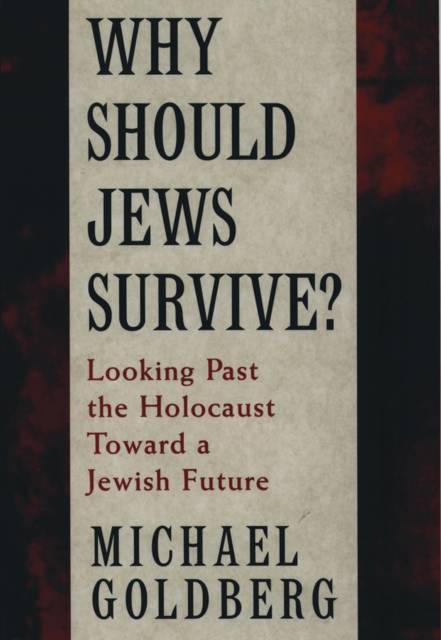
- Retrait gratuit dans votre magasin Club
- 7.000.000 titres dans notre catalogue
- Payer en toute sécurité
- Toujours un magasin près de chez vous
- Retrait gratuit dans votre magasin Club
- 7.000.0000 titres dans notre catalogue
- Payer en toute sécurité
- Toujours un magasin près de chez vous
Why Should Jews Survive?
Looking Past the Holocaust Toward a Jewish Future
Michael Goldberg
Livre broché | Anglais
40,45 €
+ 80 points
Description
In the fifty years since the Holocaust, the Jewish People have felt one overriding concern: survival. The ghosts of the murdered six million, along with the living generation of survivors, have called out the unifying chant, "never again." In 1948, this concern found a second focus in the state of Israel, the ultimate refuge of Jews worldwide. But Rabbi Michael Goldberg finds that these twin pillars of Jewish identity are brittle, and have already begun to crumble; they will not be enough to support or sustain the next generation. The time has come to answer the question: Why should Jews survive?
In this provocative book, Goldberg launches a bold attack on what he calls the "Holocaust cult," challenging Jews to return to a deeper, richer sense of purpose. He argues that this cult--with shrines like the U.S. Holocaust Museum, high priests such as Elie Wiesel, and rites like UJA death camp pilgrimages--is deeply destructive of Jewish identity. As the current "master story" of Judaism, Goldberg writes, the Holocaust has been used to depict Jews as uniquely victimized in human history--transforming them from God's chosen to those who manage to survive despite God's silent complicity in their persecution. This Holocaust-centered, survival-for-survival's-sake Judaism is already showing its emptiness, Goldberg contends; the generation that survived Hitler and founded Israel is dying, and the new generation seems adrift (for instance, one recent survey predicts that 70% of American Jewish marriages will be intermarriages by the turn of the century). Jews need positive reasons for remaining Jewish, he argues; they need to return to the Exodus as their master story--the story of God leading the Jews out of slavery and making with them an eternal covenant that gave the Jews a unique place in God's plan. The Jews should survive, Goldberg concludes, because they are the linchpin in God's redemption of the world.
Rabbi Michael Goldberg has long wrestled with the crisis of identity facing today's Jewish community. In Why Should Jews Survive?, he provides a provocative and powerfully argued challenge to the dominant theme of modern Jewish thought.
In this provocative book, Goldberg launches a bold attack on what he calls the "Holocaust cult," challenging Jews to return to a deeper, richer sense of purpose. He argues that this cult--with shrines like the U.S. Holocaust Museum, high priests such as Elie Wiesel, and rites like UJA death camp pilgrimages--is deeply destructive of Jewish identity. As the current "master story" of Judaism, Goldberg writes, the Holocaust has been used to depict Jews as uniquely victimized in human history--transforming them from God's chosen to those who manage to survive despite God's silent complicity in their persecution. This Holocaust-centered, survival-for-survival's-sake Judaism is already showing its emptiness, Goldberg contends; the generation that survived Hitler and founded Israel is dying, and the new generation seems adrift (for instance, one recent survey predicts that 70% of American Jewish marriages will be intermarriages by the turn of the century). Jews need positive reasons for remaining Jewish, he argues; they need to return to the Exodus as their master story--the story of God leading the Jews out of slavery and making with them an eternal covenant that gave the Jews a unique place in God's plan. The Jews should survive, Goldberg concludes, because they are the linchpin in God's redemption of the world.
Rabbi Michael Goldberg has long wrestled with the crisis of identity facing today's Jewish community. In Why Should Jews Survive?, he provides a provocative and powerfully argued challenge to the dominant theme of modern Jewish thought.
Spécifications
Parties prenantes
- Auteur(s) :
- Editeur:
Contenu
- Nombre de pages :
- 208
- Langue:
- Anglais
Caractéristiques
- EAN:
- 9780195111262
- Date de parution :
- 10-10-96
- Format:
- Livre broché
- Format numérique:
- Trade paperback (VS)
- Dimensions :
- 134 mm x 201 mm
- Poids :
- 176 g

Les avis
Nous publions uniquement les avis qui respectent les conditions requises. Consultez nos conditions pour les avis.






